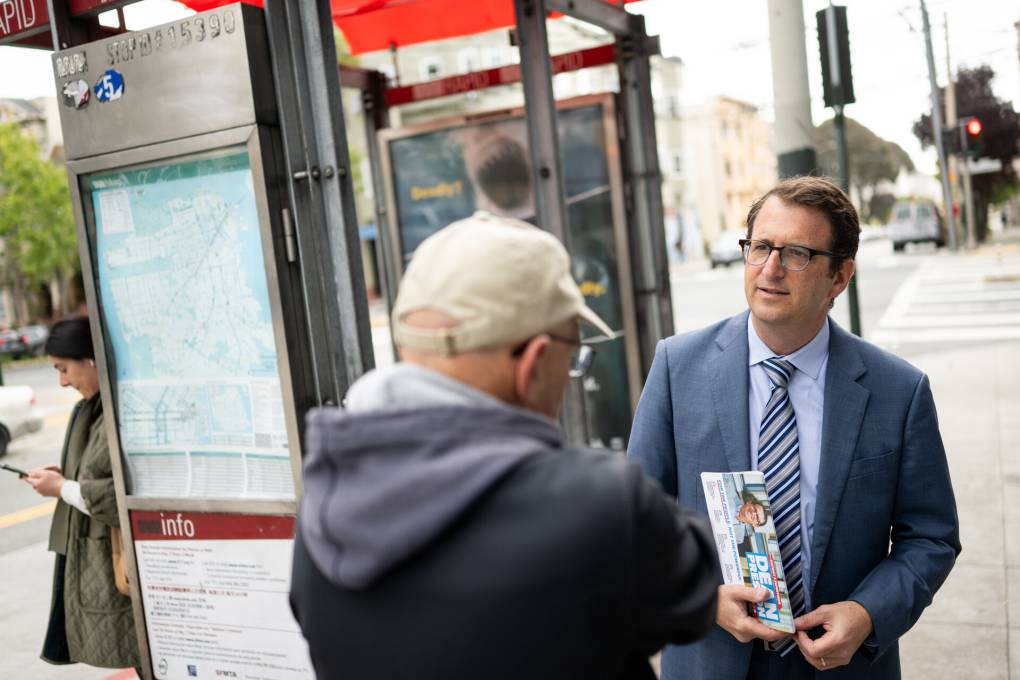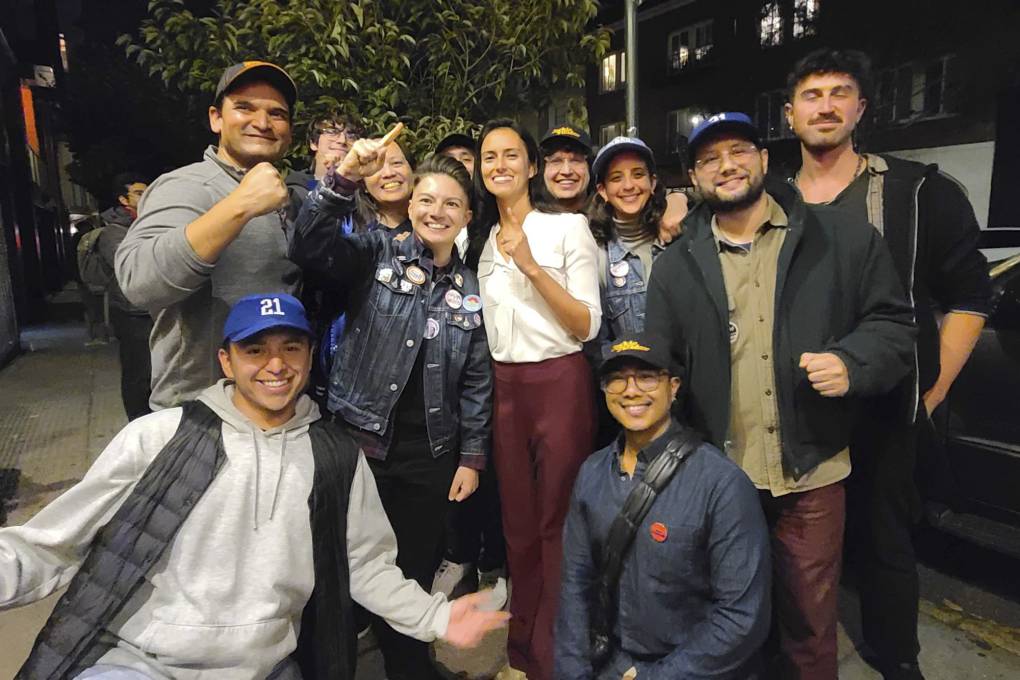Election 2024 Live Updates: Bay Area and California
Follow KQED reporters as we cover election results from across the Bay Area and California.
That's all, folks
With gratitude to all who stayed with us, we are calling it a day – KQED’s election live blog is no longer being updated.
KQED reporters, photographers and editors are still reporting the latest news on local races and measures, and you can find those stories as they publish here. And keep checking our results page for the latest vote tallies on every race in the Bay Area.
California measure to ban involuntary servitude trails, but supporters are hopeful
The latest results for Proposition 6, which would ban involuntary servitude in California prisons, show the measure trailing by nearly 10 percentage points.
Still, supporters of the measure — which had no organized opposition — are holding out hope.
“As we patiently wait, we have noticed that the margin has decreased as support has increased,” said Paul Bailey, treasurer and executive director of Legal Services for Prisoners with Children. “Together we stand with a growing movement to reject the outdated practice of forced prison labor and remnants of slavery.”
Proposition 6 was placed on the ballot by the state Legislature — as recommended by the task force studying reparations for Black Californians — and was supported by the state Democratic Party and prison reform groups.
Over half of votes had been tallied as of Wednesday morning.
SF’s democratic socialist supervisor is trailing in reelection battle

Early results in San Francisco’s District 5 have tech entrepreneur Bilal Mahmood leading incumbent Dean Preston for the Board of Supervisors. After four rounds of ranked-choice elimination narrowed it down to the two candidates, the relative newcomer is up by about 1,000 votes, leading Preston 53% to 47%.
While Preston, a democratic socialist who has represented the diverse district since 2019, held a slim lead in the first round of voting, Mahmood picked up the majority of Autumn Looijen’s and Scotty Jacobs’ supporters as they were knocked out of ranked-choice voting rounds.
Preston told KQED building a coalition of moderate support seemed to be the three other main candidates’ strategy, but he expects later batches of votes to swing more heavily toward his progressive platform.
“All these candidates pretty much ran on just attacking me, not really on any vision of their own for the district,” he said at his campaign party late Tuesday night. “That’s their strategy and we’ll see how it plays out.”
The race to represent the Tenderloin, Hayes Valley, Western Addition and Fillmore has been the most expensive supervisors’ race this election cycle — aided by a moderate PAC that raised more than $250,000 to defeat Preston.
He and Mahmood raised significant amounts of money as well, coming in at just around $500,000 each. Looijen and Jacobs added another $140,000 a piece.
More results from local San Francisco races aren’t expected until Thursday.
Recalls in Alameda County appear headed for success
So far, voters appear likely to recall Oakland Mayor Sheng Thao and Alameda County District Attorney Pamela Price. The latest results show about 65% of voters in favor of each respective recall, which would pass with a majority vote.
At an election watch party in Oakland on Tuesday night, Thao said that “Oaklanders vote late” and that she was optimistic that late drop-off ballots would be in her favor.

As for Price, her supporters stood by her (metaphorically) Tuesday night as election results came in.
“Our voters elected her to office, and we need to let her do her job,” said LaNiece Jones, executive director of Black Women Organized for Political Action.
Price hasn’t spoken publicly yet.
Benicia mayor leads in bid for reelection
Benicia Mayor Steve Young swept up 66.74% of the vote, appearing to defeat his opponent, Kevin Kirby, a political newcomer, who took 33.3% of the vote, according to preliminary results released Tuesday night.
Young promised to preserve the long-term character and financial health of the city. Benicia’s struggling to close an annual $6.5 million structural deficit. Young has supported efforts to enact a real property transfer tax to fund city services that support businesses.
The mayor’s contest comes at a time when local officials are questioning the city’s relationship with its largest taxpayer, Valero. On Oct. 31, state and Bay Area air regulators levied a historic $82 million fine against the company for unreported excess toxic chemical emissions at its Benicia refinery over nearly two decades.
“This penalty sends a strong message; adherence to air quality standards is both necessary and expected, and failure to do so can lead to significant fines,” Young said in an Oct. 31 press release announcing the record fine against Valero.
Young, who serves on the board of directors for the Bay Area Air Quality Management District, supported bringing a new, more aggressive executive director to the regulatory agency.
Jackie Fielder leads San Francisco District 9 supervisor race
On what appears to be a difficult night for progressives around the Bay Area, one was in a celebratory mood: Jackie Fielder, who’s leading San Francisco’s race for District 9 on the county’s Board of Supervisors.
Fielder led with nearly 60% of ranked choice votes to second-place challenger, public school teacher Trevor Chandler, with 44% at 11 p.m.
“The multi-racial, multi-generational working class movement we have been able to build has proven that San Francisco is not about doom and gloom or about naysayers, but it’s about what we can all do for the city that we love,” she said outside Bar Part Time in the Mission District, one of the neighborhoods that make up District 9, along with Bernal Heights and the Portola.

Fielder faced a difficult campaign against Chandler, who had the backing of well-financed moderate groups like TogetherSF, which also backed former interim mayor Mark Farrell, and Roberto Hernández, who has led several social justice movements in the Mission District for decades and was one of the founders of the Mission Food Hub, which fed thousands of families during the pandemic. “There’s a lot of billionaire money flowing into these different elections, and District 9 did not buy it,” Fielder told KQED. “District 9 is not for sale.”
During the past few months, KQED spoke to dozens of voters across District 9 who shared some of their top concerns: saving small businesses, many still struggling since the pandemic; public safety concerns at the 16th Street and 24th Street plazas; and expanding affordable housing.
“We need to invest in our entire public safety system, preventative measures, activate spaces like the plazas, and I’ve consistently said that I really want to bring the longtime street vendors back to Mission Street who have been a crucial part of our community,” Fielder said.
Some of Fielder’s supporters gathered at Bar Part Time shared their frustration at the national and state results, but said that Fielder’s victory gives them hope of what can be achieved in politics, especially at the local level.
“We had a really special candidate,” said Tuesday Rose Thornton, a Mission District resident and eviction defense lawyer. “But for District 9, we actually loved this candidate … we were voting for Jackie. We weren’t voting against the other guy, and that really mobilizes people.”
Betty Duong 'Cautiously Optimistic' in Historic Santa Clara County Supervisor Race
In a closely watched race for supervisor in Santa Clara County, Betty Duong is leading former San José City Council member Madison Nguyen 52% to 48% in returns released Tuesday night.
Duong, the current chief of staff to District 2 supervisor Cindy Chavez, is hoping to claim Chavez’s seat on the board.
“I feel so good and, I would say, cautiously optimistic,” Duong told KQED while describing the mood at her downtown San José election night party as “absolutely joyful.”
Duong and Nguyen are both running to make history: the winner of the election will become the county’s first Vietnamese American supervisor. District 2 falls entirely within San José, home to one of the largest Vietnamese communities in the U.S.
Politically, the two are split along familiar lines in the South Bay: Duong has the backing of organized labor, while business groups have rallied behind Nguyen.
Statewide rent control initiative fails
Voters have rejected Proposition 33, a bid to give local governments more power to regulate rents. The Associated Press called the race shortly after midnight, with the measure failing 62% to 38%.
It’s the third time in six years that voters have shot down similar attempts to roll back the Costa-Hawkins Rental Housing Act of 1995, the state law that keeps cities in check when it comes to rent caps.
Proposition 33 and the other rent control related initiative on the ballot, Proposition 34, were the most expensive measures on this year’s ballot, drawing in over $230 million in contributions between them. Proposition 34 is leading with just over 51% of the vote, but remains too close to call.
Harris watch parties wind down in Bay Area as mood deflates
Momentum wound down at watch parties in the Bay Area for Vice President Kamala Harris as election results streamed in Tuesday.
At Home of Chicken and Waffles, a restaurant in Oakland’s Jack London Square, fewer than a dozen people lingered after 10 p.m. The party was organized by Black Women Organized for Political Action (BWOPA) and cosponsored by Howard University alumni of the Bay Area, the Urban League of the Greater SF Bay Area, and Coalition of 100 Black Women.
Kimberly Mayfield told KQED’s Sasha Khokha that she was still holding out hope.
“I think it’s always darkest before the dawn,” she said, adding, “This is a country that embraced chattel slavery, so we have seen the worst of times.”
California poised to pass $10 billion climate bond
Californians appear poised to pass Proposition 4, a $10 billion climate bond to help the state prepare and adapt for the impacts of climate change. Nearly 58% of early votes favored the bond compared to 42% against the measure. The Associated Press has yet to call the race.
Proponents of the bond argued over the course of the campaign that it could prevent billions of dollars in damage from extreme storms, wildfires, drought and rising sea levels.